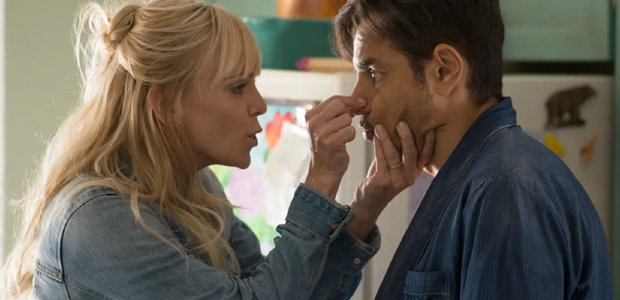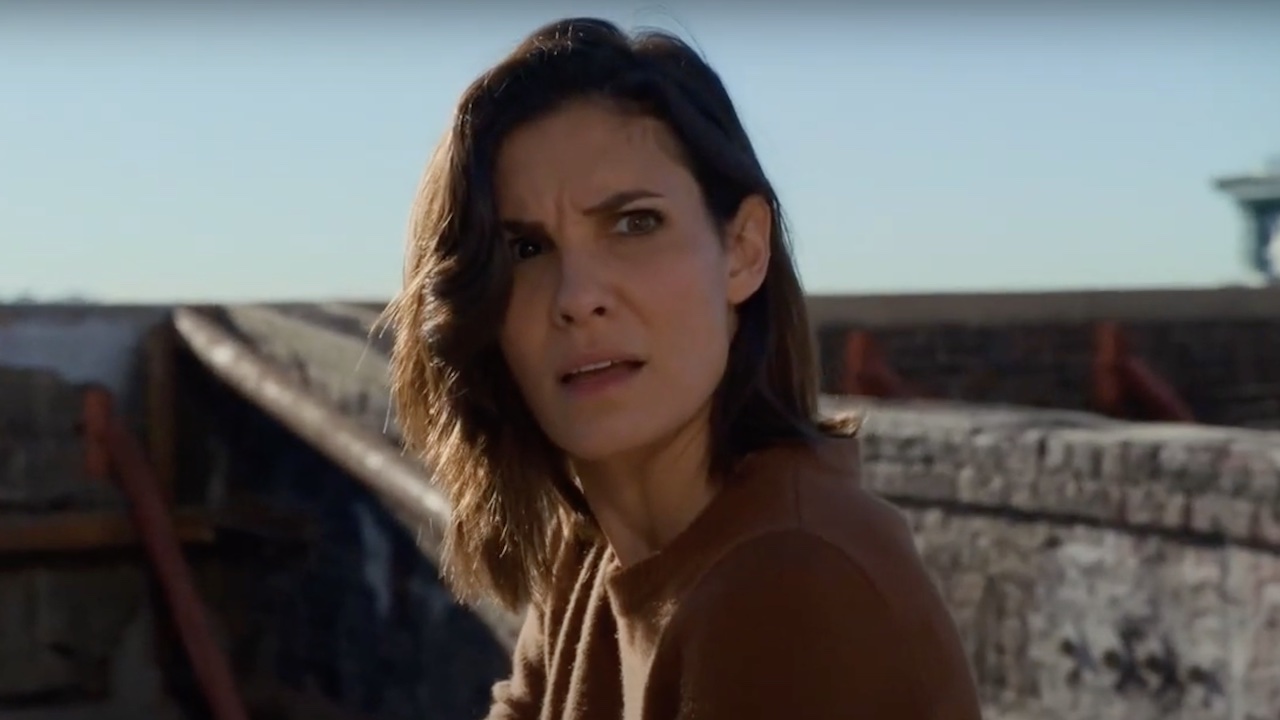Despite what the reputation may suggest, "remakes" are not the worst thing in the world. Sure, there is something to the argument about intellectual bankruptcy -- rehashing old ideas instead of gambling on new ones, but generalizations are foolish. Cinema history is filled with remakes that are better than the original, and with each new one that's made, there's no reason to not expect that any new one might be able to accomplish the same feat. The key is raison d'etre: establishing a legitimate reason for the film to exist.
To its credit, this is something that director Rob Greenberg's Overboard possesses. Rather than being a carbon copy, it borrows the conceit from Garry Marshall's original, and gender-swaps the two lead roles, having Anna Faris and Eugenio Derbez play the Kurt Russell and Goldie Hawn parts respectively. It's an interesting approach, and much like the 1987 film, it gets good mileage from the likability of its stars -- but it also can't get past some of the inherent issues that come part and parcel with the concept. Not only is the alternate title Gaslighting: The Movie still very much applicable, but the new Overboard also just feels dated and fails to possess any kind of freshness 31 years later.
Co-scripted by Rob Greenberg and Bob Fisher, Overboard centers on Anna Faris as Kate Sullivan, a single mother of three daughters (Alyvia Alyn Lind, Hannah Nordberg, Payton Lepinski) who works cleaning carpets and delivering pizzas all while studying to become a nurse. She is struggling just to keep her head above water, and it's at this particularly terrible time that she meets Leonardo Montenegro (Eugenio Derbez), a rich, egotistical prick living off the money from his father's business. Kate is hired to clean the carpets of his yacht, but it's an experience that goes horribly. Not only does he act endlessly sleazy, but he fires her and dumps her equipment in the ocean when she refuses to act like one of his servants. As bad as things are for Kate, Leonardo has made them even worse.
This is when karma kicks in. A storm causes Leonardo to fall off his boat at night, and when he washes up on the shore he has no idea who he is. Because his sister (Cecilia Suárez) is attempting a corporate takeover while their father is dying, Leonardo is left with nobody to identify him, so Kate activates her revenge mission. With a series of hoop-jumping lies, she successfully convinces him that he is her husband, and sets it up so that he can go out and work to provide for the family while she stays at home and studies for her upcoming exam.
The movie does have the occasional clever/funny line (including a fun little shout-out to the original), but what really keeps Overboard going is just the charm of Anna Faris and Eugenio Derbez. To her credit, Faris seems to be having a lot of fun in the performance, and it is successfully magnetic. Likewise, Derbez not only does a great job playing an obnoxious asshole, but he does a nice job leaning into the character's arc as he's forced to gain some humility. To that end, it's also worth noting that the two have solid chemistry together, and they play off each other well both before and after his accident.
The big problem is that the film fails to address what is classically the biggest problem with Overboard as a story. As obnoxious as Leonardo may be, and as mature as he may become, the whole premise of the ruse is morally grotesque, and it's not only in the back of the mind of every viewer, but it winds up having serious implications on how you ultimately view the progression of the story, the characters, and their choices. It's getting too far into spoilers to be fully discussed, but it's hard to feel good about any kind of happy ending when the extent of the psychological con isn't fully addressed. And no, the gender swap aspect doesn't do anything to soften this issue that plagued the original comedy.
Strangely, though, it also very much contributes to how dated the whole affair feels. Overboard isn't in the category of Porky's or Revenge of the Nerds when it comes to 1980s comedies that are cringe-worthy by today's moral standards, but it is borderline, and it lends the remake a strange regressive quality (if you were to edit out all of the technology, it would probably be indistinguishable from a feature of the era). One could make the argument that it adds a certain throwback charm, and to its credit the film surprisingly leans into Hispanic cultural influence, but it's still hard to recommend.
I'll throw Overboard a bone with some credit for at least trying to put a twist on the original... but you wish that it perhaps twisted a little bit more. The film definitely isn't the disaster that it could have been, however, it's also entirely forgettable.

Eric Eisenberg is the Assistant Managing Editor at CinemaBlend. After graduating Boston University and earning a bachelor’s degree in journalism, he took a part-time job as a staff writer for CinemaBlend, and after six months was offered the opportunity to move to Los Angeles and take on a newly created West Coast Editor position. Over a decade later, he's continuing to advance his interests and expertise. In addition to conducting filmmaker interviews and contributing to the news and feature content of the site, Eric also oversees the Movie Reviews section, writes the the weekend box office report (published Sundays), and is the site's resident Stephen King expert. He has two King-related columns.











